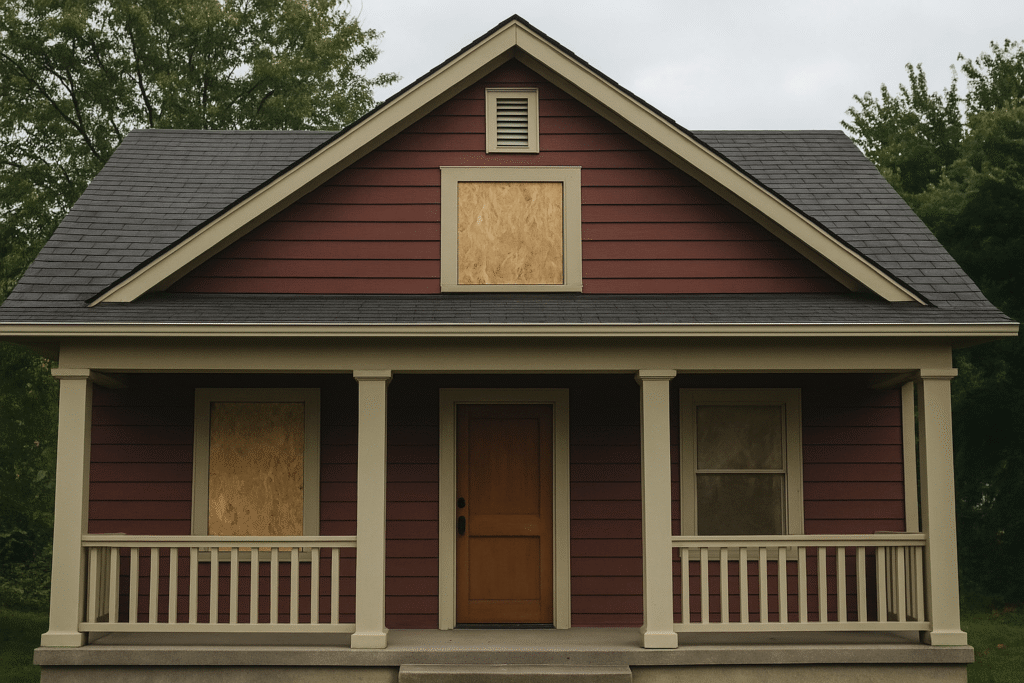Understanding Probate and Foreclosure
Probate is the legal process that takes place after someone passes away. During this time, the court oversees the distribution of the deceased person’s assets, payment of debts, and management of property left behind. If a home is part of the estate, the executor is responsible for handling it according to the will and probate laws.
Foreclosure, on the other hand, happens when mortgage payments are missed and the lender takes legal action to recover the property. Even though a house is tied up in probate, lenders are not required to pause foreclosure. Missing payments during probate can still result in foreclosure, meaning the bank has the right to begin or continue the foreclosure process.
This is where many families get caught off guard. Probate may slow down decisions about the estate, but it does not protect the home from foreclosure if the mortgage isn’t paid. For executors and heirs, this makes it critical to act quickly—by contacting the lender, reviewing the estate’s finances, and exploring options to either pay the debt or sell the property before the bank steps in.
Can a Bank Start Foreclosure on a House in Probate?
Yes — if mortgage payments are missed, the lender can move forward with foreclosure even while the property is in probate. Many people assume that the probate process temporarily shields a home from foreclosure, but this is not the case. Probate does not excuse missed mortgage obligations, and lenders have the legal right to enforce the loan terms regardless of the estate’s status.
For the executor, this means acting quickly is crucial. If the mortgage is not paid on time, the bank can begin the foreclosure process and eventually auction the property. That can result in a loss of equity for the heirs and added stress for the family already managing probate.
To avoid foreclosure during probate, the executor or estate representative should notify the lender immediately, review available estate funds, and consider options such as selling the property, negotiating a repayment plan, or using other assets to cover the debt. Taking action early is the best way to protect the estate and prevent the bank from taking control of the property.
What to Do Immediately If a House Enters Foreclosure During Probate
When a home falls behind on mortgage payments during probate, time is critical. The lender doesn’t pause foreclosure just because the property is tied up in the court process. Here are the immediate steps an executor should take to protect the estate and prevent the loss of equity:
Open the Probate Case
The first priority is to formally open the probate case. This gives the executor or personal representative the legal authority to act on behalf of the estate, manage debts, and make decisions about the property. Without this authority, they cannot negotiate with lenders or sell the house.
Notify the Lender and the Court
It’s important to communicate quickly. Let the mortgage lender know that the estate is in probate and that you’re working to resolve the debt. At the same time, notify the probate court so the situation is documented and handled within the legal framework.
Review the Will and Estate Documents
Examine the will, trust, or other estate documents to see if there are funds or specific instructions for paying the mortgage. Some estates may have liquid assets or insurance proceeds that can cover the payments and prevent foreclosure.
Contact a Probate Attorney
Foreclosure during probate is legally complex, and an attorney’s guidance can make all the difference. A probate lawyer can explain the executor’s options, negotiate with lenders, and ensure that the estate’s rights are protected while the process plays out.
By taking these steps immediately, the executor maximizes the chances of preserving the home’s equity, avoiding auction, and protecting the interests of the heirs.

Options Available to the Executor
When a house goes into foreclosure during probate, the executor still has options to protect the estate and its beneficiaries. Acting quickly can make the difference between keeping equity in the home and losing it at auction.
Pay the Debt
The executor can use estate funds or liquidate other assets to pay the overdue mortgage balance. This satisfies the lender and prevents foreclosure from moving forward.
Sell the Property
If the estate doesn’t have enough cash on hand, the executor can sell the property before the foreclosure is finalized. In many cases, selling as-is to a cash home buyer is the fastest option, allowing the estate to cover the debt and preserve any remaining equity for the heirs.
Negotiate With the Lender
Lenders don’t always want to foreclose. Executors may be able to negotiate a temporary payment plan, forbearance, or other arrangement that buys time to settle the estate or arrange a sale.
Potential Consequences of Inaction
If the executor fails to act, foreclosure will move forward — often with serious consequences for the estate and its beneficiaries.
Bank Auction
The lender has the legal right to auction the property once the foreclosure process is complete. At this point, the estate loses control of the home.
Loss of Assets
Foreclosure strips the estate of its equity, meaning there’s less money or property available for heirs. In some cases, the property may sell for less than what’s owed, further impacting the estate.
Executor Liability
Executors are legally responsible for managing the estate’s assets. If they fail to take reasonable steps to prevent unnecessary losses, they may be held personally liable for damages to the estate and its beneficiaries.
How to Stop Foreclosure During Probate
If a house goes into foreclosure during probate, it doesn’t automatically mean all is lost. Executors and heirs still have options to slow or stop the process — but acting quickly is essential.
Communicate With the Lender
The first step is reaching out to the mortgage lender. Executors can request additional time, explain that the estate is in probate, and ask about forbearance or other temporary relief options. Many lenders will work with an estate to avoid foreclosure if communication is proactive.
Use Estate Funds or Liquidate Assets
If the estate has other funds, savings, or valuable assets, these can sometimes be used to pay overdue mortgage balances and bring the loan current. This prevents foreclosure and buys time to decide whether to sell the property.
Sell the Home Quickly to Preserve Equity
Selling the property before foreclosure finalizes is one of the most effective ways to protect the estate’s equity. Executors may choose to list traditionally if time allows, or work with a cash home buyer for a faster, as-is sale that closes in weeks instead of months.
Legal Actions (Injunctions or Extensions)
In urgent cases, probate attorneys can file injunctions or request extensions from the court to pause foreclosure. This legal breathing room can give the executor time to arrange a sale, refinance, or settle debts using other estate assets.
Why Professional Guidance Matters
Foreclosure during probate is complex, blending legal, financial, and real estate issues. Executors rarely succeed alone — professional support can make all the difference.
Probate Attorneys
A probate lawyer ensures the executor meets all legal obligations, communicates properly with the court, and explores legal remedies to delay or stop foreclosure.
Financial Advisors
Advisors can help evaluate estate debt, prioritize obligations, and recommend whether to liquidate assets, refinance, or pursue other solutions to manage the mortgage.
Real Estate Agents or Cash Buyers
If selling the property is the best option, an experienced probate real estate agent or a direct cash buyer can move quickly. Cash buyers are often ideal when time is short, since they purchase as-is and eliminate delays from inspections, repairs, or financing.
Conclusion – Protecting the Estate From Foreclosure
Probate does not stop foreclosure. If mortgage payments are missed, lenders have the legal right to move forward—even while the estate is still in probate. That’s why executors must act quickly to protect the property and preserve as much equity as possible for beneficiaries.
The first steps should include opening the probate case, notifying the lender, and reviewing estate documents to identify available funds. From there, executors can choose to pay the debt, sell the property, or negotiate with the lender. Acting fast is essential—delays often lead to bank auctions and the loss of valuable estate assets.
When selling becomes the best solution, working with a trusted local cash home buyer like Orca Homes can make the process faster and less stressful. Orca Homes specializes in buying properties as-is, even during probate, providing fair cash offers and flexible closings to help families avoid foreclosure and move forward with confidence.
FAQs About Foreclosure During Probate
Can the executor prevent foreclosure?
Yes. While probate itself doesn’t stop foreclosure, the executor can take action to delay or prevent it. This may include using estate funds to pay the mortgage, negotiating with the lender, or selling the home quickly to cover the debt. Acting fast is critical to protect the estate and beneficiaries.
Does the bank need court approval to foreclose during probate?
No. A lender does not need court approval to foreclose if mortgage payments are missed, even during probate. The foreclosure process can proceed unless the executor or estate intervenes with payments, negotiations, or a sale.
Is the mortgage forgiven when the borrower dies?
No. A mortgage is tied to the property, not the individual. When the borrower passes away, the estate (managed by the executor) becomes responsible for the loan. If payments aren’t made, foreclosure can still happen.
What happens to the estate if foreclosure goes through?
If foreclosure is completed, the lender sells the property at auction. Proceeds go first to cover the mortgage debt, with any remaining equity (if there is any) distributed back to the estate. However, if the sale doesn’t cover the balance, the estate may lose the property entirely, leaving fewer assets for heirs.




